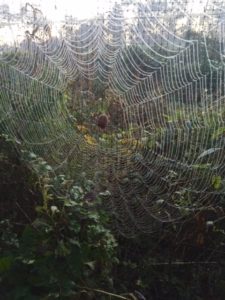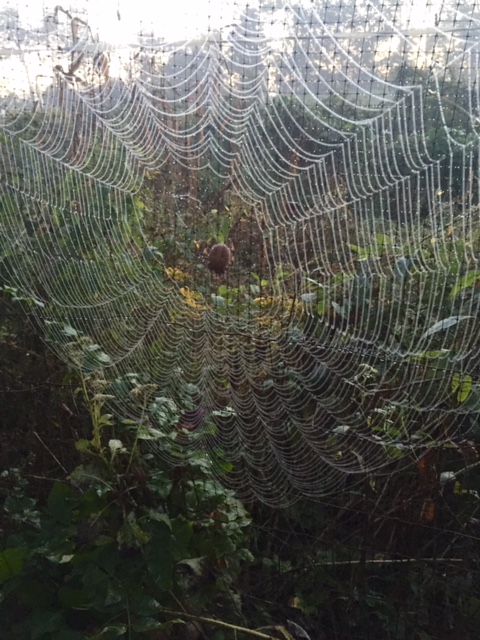 We live in a web of ideas, a fabric of our own making. ~Joseph Chilton Pearce
We live in a web of ideas, a fabric of our own making. ~Joseph Chilton Pearce
I’m editing my latest story right now. While I was writing this story that won’t be published until next September 2017, I sometimes felt as though I was having to dredge up every word. I wasn’t sure any word I was finding was a right word. I struggled to find “the end.” I was, at times, certain the story was unreadable, that I hadn’t spun a good story web.
Then, after I did find those necessary “the end” words and read the story over, I was pleased to see that I had spun a story. I was still on pins and needles until my editor read it and loved the story. That’s when a writer can really breathe easier – when someone else agrees that you did spin a proper story web. That you somehow managed to connect all the strands in the right ways so that the story holds together in a strong enough way to perhaps eventually catch a few readers in your silken story threads and wrap them up in your story.
But now as I edit to make the improvements my editor suggested, I can’t forget about that story web. Each change I make, each bit of web I break (delete) or newly spin (rewrite), can affect every other part of the story. So I have to let the characters come back to life in my head. I have to keep in mind the connections, the story threads. Each word, each sentence, each paragraph, each page, each chapter – all strands in the story web that can’t be broken if I’m going to fully capture my readers’ imaginations.
The next time you see a spider web, please, pause and look a little closer. You’ll be seeing one of the most high-performance materials known to man. ~Cheryl Hayashi
That’s true. Spiderwebs are amazing. But then so are stories. So are our imaginations, whether we’re writing or reading.
Talking, talking. Spinning a web of words, pale walls of dreams, between myself and all I see. ~John Gardner
But the words aren’t only spun between the writer and all that he or she sees as John Gardner says here, but between the writer and the reader. Thank you for being one of those readers.
Have you ever thought of a story as being like a web?


Comments 6
Yes, I can think of a story as being like a web. The author creates characters that work off of each other’s personalities and situations. Each story has it’s own web. Very interesting. 🙂
Author
Right, Melissa. When I think about a story, it’s sometimes like a number of threads all woven together to make a good pattern. Like the lovely pattern of a spider web.
I never thought of a story as a spider web but I often think of how a book ” flows”. I guess the spider web explains it well. Ann, your books ” flow” they don’t seem forced or awkward. They just seem real! They make Great reading!
Author
So nice of you to tell me that, Paula. But I compare a story to a web because somehow you have to connect all the different story threads into a pattern. But flow is good too. Without a good flow to the story, a book is hard to read. I definitely wouldn’t want my stories to be awkward even if sometimes I might let a character feel awkward. 🙂
Now I have a new respect for spider webs and books. Included in that respect
are the spiders and writers who create them, too.
Author
I’m only a big fan of spiders when they are outside on their webs and I don’t walk into said webs, Pat. LOL. But when I do see those intricate webs, I’m always amazed at this little creature who can spin that web. Where does all that web material come from? The spider doesn’t look that big. The Lord created some unique and interesting creatures. Including of course those writers and readers in our world. 🙂